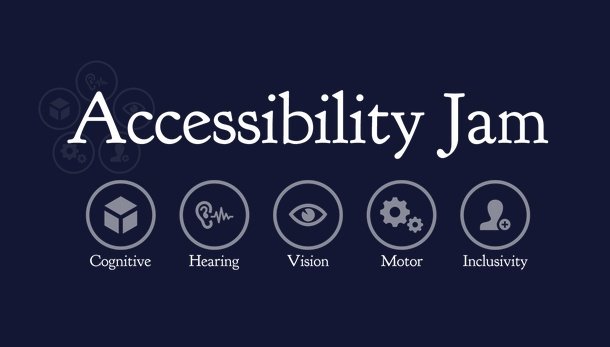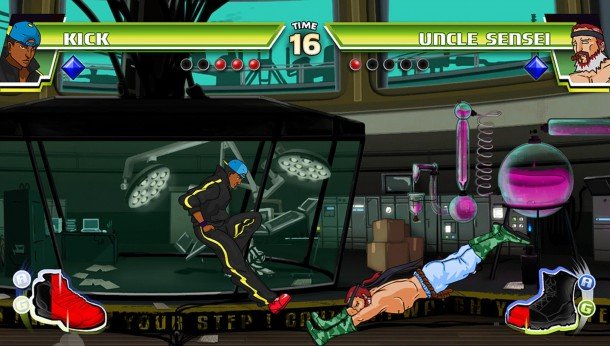Accessibility Jam interview: how a gamejam hopes to raise accessibility awareness

The three week Accessibility Jam started yesterday, an event designed to promote and demystify accessibility in gaming. Taking place online and incorporating #A11yJam—a three-day event in London—the organisers hope to use the rapid game creation formula to show developers that supporting impaired gamers isn't an expensive, time-consuming or design restricting practice. To find out more about the jam, and what it hopes to achieve, I talked to two of the event's organisers: accessibility specialist Ian Hamilton and game developer Jonard La Rosa.
While gamejams primarily appeal to indie teams and solo developers, it isn't just those groups that the Accessibility Jam hopes to target. "If anything its more of an issue for larger studios," says Hamilton. "Individuals and smaller indies are free to quickly make whatever changes they see fit, and for whatever reasons they see fit, whereas larger studios are often more structured, with big carefully managed prioritised backlogs of possible features."
With Accessibility Jam—and his work with the Game Accessibility Guidelines —Hamilton is attempting to combat an entrenched set of assumptions: that accessibility is difficult, expensive, and only benefits a limited percentage of the audience.
"It is absolutely a misconception," Hamilton says. "The fact that it's even possible to think about accessibility in the space of a game jam proves that. I've seen games produced in less than 48 hours that completely blow the accessibility efforts of most AAA games out of the water."
The key, Hamilton says, is to think about accessibility at an early point in the design process. That way, implementation is much easier and cheaper. "Those design decisions aren't niche things either. Accessibility is about avoiding unnecessary barriers, so often what's a showstopping barrier for someone with an impairment is actually still a bit of an annoyance for everyone else too, so you're actually making the game better for everyone."

By understanding the key principles, developers can implement accessibility into unlikely games. "Take Bayonetta for example," Hamilton says. "Many developers would instinctively think that it couldn't be made more accessible to people with impaired motor ability, as the frantic execution of complex combos is the core gameplay; a barrier that can't be avoided. But the Bayonetta devs actually abstracted it out a bit, and realised that their core mechanic isn't complexity, it's enjoying pushing your motor skills to the limit and being rewarded with a flashy combo as a result. So their difficulty setting go all the way down to single button mode, where the running around is done for you, and you just have to hit a single button at the right point to execute a combo."
For Hamilton, then, the biggest mistake developers can make is not stepping out of their own shoes. "You often see taglines like this on indie studios websites in particular—'we design games that we love, and hope other people do too'. That's quite a gamble to be taking ... Not everyone has as accurate vision as you, not everyone is as good with a controller as you, and certainly not everyone has the same intimate familiarity with everything that the game is trying to achieve as you." La Rosa summarises the pitfalls more plainly. "The typical bad practice is not considering accessibility to begin with," he says.
Keep up to date with the most important stories and the best deals, as picked by the PC Gamer team.
The London meet-up, running May 16th - 18th, will feature a workshop as well as a gamejam—giving developers a chance to see talks and receive on-site guidance from accessibility specialists. The three-week online jam will run around it, and feature a separate theme to be announced at the start of the event. "This way," La Rosa says, "it was clear that 'accessibility' itself was not the theme. It was obvious that this would be mistaken as such. We did not want to make it a niche."
Originally conceived as just the London event, the online component came almost by coincidence. "Initially I sought to make an online game jam to make accessible games for the blind," La Rosa says. "Subsequently, with the help of David DeCarmine of gamejolt, I ended up teaming with Ivano Palmentieri and 0x0961h (I really don't know his name). We decided to take on the challenge of making a jam for all major categories of impairments. With the help and support of GAAD founders, all the resources of The AbleGamers Foundation as well as Ian Hamilton's expertise and guidance, this event wouldn't have culminated in such a way it has just in time for May 15 and #A11yJam."
Accessibility Jam kicked off Sunday, May 11th.

Phil has been writing for PC Gamer for nearly a decade, starting out as a freelance writer covering everything from free games to MMOs. He eventually joined full-time as a news writer, before moving to the magazine to review immersive sims, RPGs and Hitman games. Now he leads PC Gamer's UK team, but still sometimes finds the time to write about his ongoing obsessions with Destiny 2, GTA Online and Apex Legends. When he's not levelling up battle passes, he's checking out the latest tactics game or dipping back into Guild Wars 2. He's largely responsible for the whole Tub Geralt thing, but still isn't sorry.

